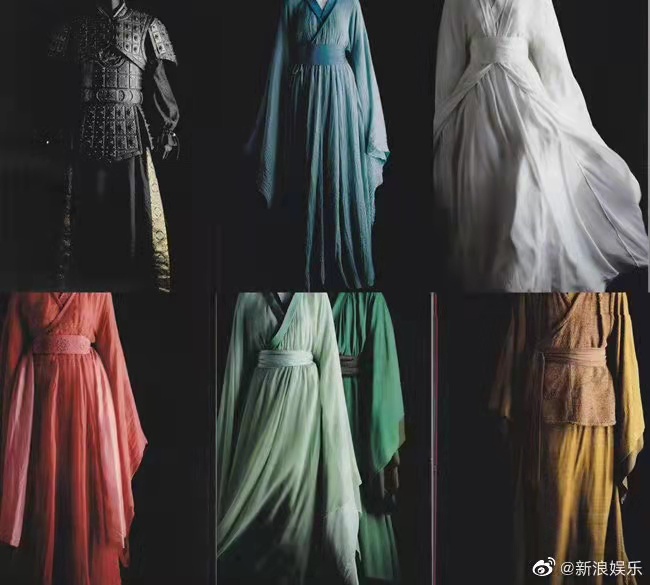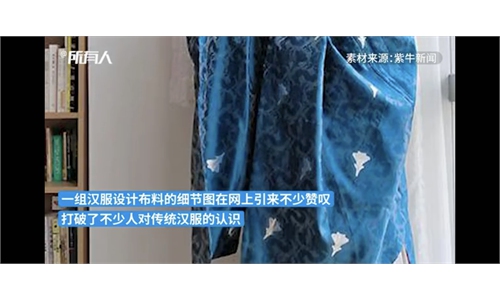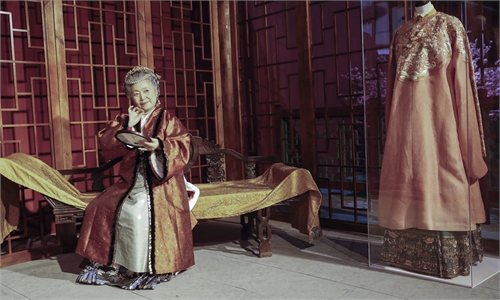ARTS / FILM
Chinese filmmakers mourn for Japanese designer Emi Wada for her unique costume designs in films like Hero

Costumes designed by Emi Wada Photo: Sina Weibo
Oscar-winning Japanese costume designer Emi Wada, who had created unique clothing for a number of world famous Chinese films such as Hero (2002) by director Zhang Yimou, has passed away at the age of 84, according to media reports citing her family on Sunday.
Respected as a legendary female designer who conveyed Eastern aesthetics to audiences through her designs, Wada designed costumes for many Chinese films - especially martial arts-themed productions - that added “oomph” to the films.
“The Hero costumes, especially the heroines’, engage heavy colors such as dense red and blue. It is impressive that such eye-attracting costumes still can appear to be airy when the character moves, a splash of red dancing in the wind with the martial arts elements. It adds oomph to the film and shows the aesthetics of Chinese culture,” Yunxing, a professional traditional Chinese hanfu designer, told the Global Times on Monday.
Besides designing for Zhang Yimou’s Hero (2002) and House of Flying Daggers (2004), Wada also collaborated with other Chinese filmmakers such as Tian Zhuangzhuang for the film The Go Master and films starring Chinese actors like Zhang Ziyi and Lin Qingxia.
Despite her declining health, in 2020 she accepted the offer to design costumes for Ann Hui’s Love After Love, which premiered at the Venice International Film Festival that same year.
Zhang Yimou and Ma Sichun, the actress in Love After Love, mourned Wada on China’s Twitter-like Sina Weibo on Sunday.
“Emi Wada made too many beautiful works for us to cherish. May she continue to decorate Heaven with brocade and silk,” said Ma.
Wada died on November 13. Born in Japan, she received her first Oscar title for her work in Akira Kurosawa’s 1985 film Ran.
Besides her contributions to film, she also designed clothing for the stage, collaborated with Chinese composer Tan Dun for his work The First Emperor and worked on the costumes for the classic Chinese opera The Peony Pavilion in collaboration with the National Ballet of China.
“To be able to design such pieces, it takes not only a refined taste in textiles, but also a deep sense of Chinese culture that has shared philosophical roots with Japanese culture,” Zhang Qi, an East Asian art researcher, told the Global Times.

Costumes designed by Emi Wada Photo: Sina Weibo
Oscar-winning Japanese costume designer Emi Wada, who had created unique clothing for a number of world famous Chinese films such as Hero (2002) by director Zhang Yimou, has passed away at the age of 84, according to media reports citing her family on Sunday.
Respected as a legendary female designer who conveyed Eastern aesthetics to audiences through her designs, Wada designed costumes for many Chinese films - especially martial arts-themed productions - that added "oomph" to the films.
"The Hero costumes, especially the heroines', engage heavy colors such as dense red and blue. It is impressive that such eye-attracting costumes still can appear to be airy when the character moves, a splash of red dancing in the wind with the martial arts elements. It adds oomph to the film and shows the aesthetics of Chinese culture," Yunxing, a professional traditional Chinese hanfu designer, told the Global Times on Monday.
Besides designing for Zhang Yimou's Hero (2002) and House of Flying Daggers (2004), Wada also collaborated with other Chinese filmmakers such as Tian Zhuangzhuang for the film The Go Master and films starring Chinese actors like Zhang Ziyi and Lin Qingxia.
Despite her declining health, in 2020 she accepted the offer to design costumes for Ann Hui's Love After Love, which premiered at the Venice International Film Festival that same year.
Zhang Yimou and Ma Sichun, the actress in Love After Love, mourned Wada on China's Twitter-like Sina Weibo on Sunday.
"Emi Wada made too many beautiful works for us to cherish. May she continue to decorate Heaven with brocade and silk," said Ma.
Wada died on November 13. Born in Japan, she received her first Oscar title for her work in Akira Kurosawa's 1985 film Ran.
Besides her contributions to film, she also designed clothing for the stage, collaborated with Chinese composer Tan Dun for his work The First Emperor and worked on the costumes for the classic Chinese opera The Peony Pavilion in collaboration with the National Ballet of China.
"To be able to design such pieces, it takes not only a refined taste in textiles, but also a deep sense of Chinese culture that has shared philosophical roots with Japanese culture," Zhang Qi, an East Asian art researcher, told the Global Times.


